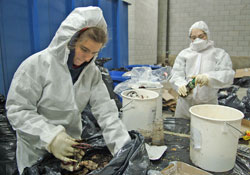Sustaining environmental practices

R4 Coordinators Louise Henault-Ethier (left), Chantal Beaudoin (in the mask) and nearly 10 others snapped on the rubber gloves during the group’s recycling audit of the Loyola Cafeteria in early February. They dug through a week’s worth of trash, a total of 250 bags weighing 840 kg. The result? After filtering out reusable, recyclable and biodegradable material, only 17 per cent of what was thrown out was actually pure garbage. R4 is now working with the cafeteria to put a recycling program in place.
Photo by kate hutchinson
About 50 faculty, staff, students and administrators attended Weaving the Tapestry: Concordia’s Opportunities for Excellence and Innovation Through Sustainability. It was the first conference organized by Sustainable Concordia to bring together members of the campus community.
The aim of the Feb. 17 gathering was to educate about sustainability, raise the group’s profile on campus and to explore how it can work more closely with Concordians.
“It’s great to see such a high turnout. We put so much time and energy into this,” said Sustainability Coordinator Melissa Garcia Lamarca. The response was so strong that many of those who waited until early February to RSVP were waitlisted.
“Concordia is poised to become a leading university in terms of sustainability. We’re on our way to becoming an international leader. But many people here on campus don’t know what’s going on,” said Cameron Stiff, Assistant to the Sustainability Coordinator.
In 2002, the student-organized group pioneered a campus-wide sustainability assessment. It has been used as a model by 22 other universities across Canada.
The university continues to follow up on many of the recommendations made in that and subsequent reports. Recent successes include using only carpets made from recycled materials and the construction of the EV and Science Complexes.
Both are 50 per cent more energy efficient than older buildings on campus.
Marvin Cooper, Facilities Management in Recreation and Athletics, said the installation of artificial turf at Loyola Stadium means they no longer have to use fertilizer. Lines no longer have to be painted on the field with latex paint, but are woven into the turf.
“Now, when the City of Montreal comes to do inspections, the pollution we cause is negligible.”
Members of faculty and staff raised concerns about issues such as energy use, accessibility to recycling bins and most of all, paper use.
“My dream is for students to be able to do their exams on a screen instead of in a paper booklet,” said Philipe Colas, a professor in the John Molson School of Business.
Others suggested printers and photocopiers be programmed to make double-sided copies, and that professors accept recto-verso assignments.
Chantal Beaudoin, Environmental/R4 Coordinator, agreed. Other recycling initiatives are in the works. In the next few weeks, more bins will appear on campus with clearer signs to help users deposit recyclables in the correct vessel.
She and R4 volunteers also did a recycling audit at the Loyola Cafeteria between Jan. 30 and Feb. 5. They sifted through a week’s worth of garbage – 250 bags weighing 850 kg.
Among their findings was that 26 per cent of their contents – such as cardboard, paper, glass and cardboard – were recyclable. They plan to outfit the cafeteria with bins and arrange disposal services.
“In some instances, we found single cardboard boxes that were being double-bagged. They already flatten their boxes and take them outside. They just need the right receptacle for them,” Beaudoin said.
ustainable Concordia is now gearing up for its second Sustainable Business Conference. Last year’s edition brought together 250 members of the private and public sectors and the university community. Click here for more information.